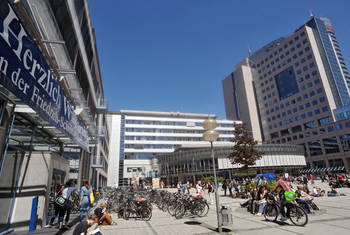Michael Fritsch What Impact do Start-Ups Really Have on Regional or National Economic Development?
Michael Fritsch is Professor of Business Dynamics, Innovation and Economic Change at Friedrich Schiller University Jena. Having previously held posts at Indiana University, Carnegie Mellon University, and Technical University Berlin, Fritsch is associate editor of the journals Regional Studies and Small Business Economics and he sits on the editorial boards of the European Journal of Innovation Management and the Journal of Global Entrepreneurship Research. His main research interests include new business formation processes and their impact on economic development and economic development strategies.
Area of Research
Economics of Innovation
since 2018
Senior Professor
Friedrich Schiller University Jena (Friedrich-Schiller-Universität Jena) (more details)
Department of Economics
2006-2018
Full Professor
Friedrich Schiller University Jena (Friedrich-Schiller-Universität Jena) (more details)
Department of Economics
1992-2006
Full Professor, Chair of Economic Policy
Technische Universität Bergakademie Freiberg
1990-1992
Interim Chair of Economic Policy
Technical University of Berlin (Technische Universität Berlin)
Institute of Economics
1983-1990
Senior Research Fellow
Technical University of Berlin (Technische Universität Berlin)
Institute of Economics
1978-1982
Research Associate
Technical University of Berlin (Technische Universität Berlin)
Institute of Economics
1977-1978
Research Fellow
Berlin Social Science Centre (WZB)
1989-1989
Habilitation in Economics
Technical University of Berlin (Technische Universität Berlin)
1982-1982
Ph.D. in Economics
Technical University of Berlin (Technische Universität Berlin)
1972-1977
Master in Economics (Diplom-Volkswirt)
Technical University of Berlin (Technische Universität Berlin)
- Journal of Global Entrepreneurship Research
- Review of Regional Research
- European Journal of Innovation Management
- Center of Innovative Science and Education (CISE)
- Iberian Management & Economic Frontiers
- International Journal of Transition and Innovation Systems
 © Jan-Peter Kasper/University Jena
© Jan-Peter Kasper/University Jena

Friedrich Schiller University Jena (Friedrich-Schiller-Universität Jena)
Jena, GermanyThe Friedrich Schiller University Jena is the only traditional university in the German state of Thuringia with 10 faculties covering all disciplines. It was founded in 1558 and today offers a broad range of almost 200 different study programmes ranging from archaeology to Studies in Economics. The student body comprises about 18,000 students who, in various rankings and studies, have time and again born testimony to the good academic and study conditions at their university.
The Friedrich Schiller University is characterized by high and strong research dynamics. It has been a long tradition at the university to work interdisciplinarily, and close cooperation with non-university research institutions and the industry have always had great importance. Research at the Friedrich Schiller University focuses around the three keywords “Light – Life – Liberty”.
Special attention and support is given to young scientists and academics at the University of Jena. With it's nationwide recognized Graduate Academy, the Friedrich Schiller University puts great emphasis on optimal qualifications and the highest possible quality standards. The more than 120 cooperation agreements with universities around the world underline the international orientation of the Friedrich Schiller University who has also been able to build up a reputation of preserving culture thanks to its 42 collections and museums. (Source: University of Jena)
Department
Department of Economics
"On the 6th of December in 1991, the School of Economics and Business Administration was founded with the goal of linking liberal traditions with modern study concepts and contents. During the 1990s, a new campus, with modern- style architecture and a cafeteria, was established in the heart of the city. The School of Economics and Business Administration combines professional training with postgraduate qualifications in the fields of business, economics, business information systems and business educational studies. With our innovative and comprehensive framework in the field of economic science, we provide a formal-quantitative education based on a decision-making oriented methodology. " (Source)
Map
After Joseph Schumpeter, economists have given much credence to the role that new business formation plays in regional economic development. In this video, MICHAEL FRITSCH argues that not all Start-Ups are created equal and proposes a more balanced assessment of the factors underlying economic development. Fritsch’s research takes a region-based approach and finds that up to two-thirds of the positive economic effects of new business formation are locatable in incumbent businesses that react effectively to the emergence of innovative challengers. The research poses important questions for economists and governments alike who need to consider not only how to encourage entrepreneurial innovation but also how to support existing businesses to effectively respond to new competitors.
LT Video Publication DOI: https://doi.org/10.21036/LTPUB10636
Entrepreneurship and Growth
- Michael Fritsch
- The Routledge Companion to the Makers of Modern Entrepreneurship
- Published in 2017









